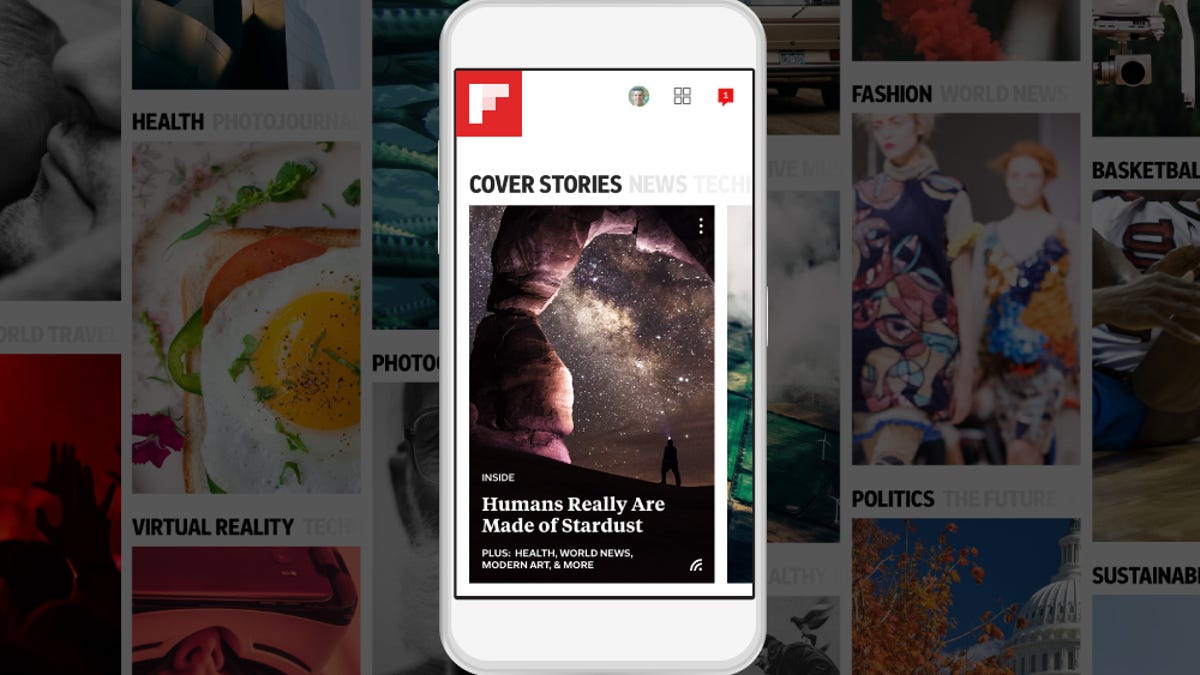Flipboard now lets you set super-specific news topics
Mike McCue, CEO of the news aggregation app, also believes in life beyond algorithms.

Flipboard unveiled its biggest update in two years.
Flipboard wants to get personal.
The maker of the news aggregator app unveiled a major redesign on Wednesday, its biggest update in two years.
The crux of the update is a change in how Flipboard organizes the stories it shows you. Instead of just grouping articles on several different subjects into one big digital "magazine," Flipboard's 100 million monthly users can now create several smaller "magazines" around different interests, like photography, drones or jazz guitar.
And within those smaller magazines, you'll be able to customize even further. If you've created a magazine about photography, you can choose topics like "today's best photos," "Canon cameras" or "landscape photography" to populate the feed. The magazine also won't just present you with articles, but tweets from prominent photographers as well.
The topics can get as niche as paleo diets to the locavore movement.
"The goal is to give people a highly personalized magazine around the thing that they are incredibly passionate about," Mike McCue, Flipboard's CEO, said in an interview.
The stories are chosen by a mix of algorithms and human curators, McCue said.
Flipboard, founded in 2010, broke out as one of the first apps to take advantage of the magazine type layout you could display on an iPad. But since its debut seven years ago, competition has popped up from formidable rivals, including Apple, which has a service for iPhones called Apple News.
The app lets you create several digital "magazines" based on your interests.
An app that aggregates news stories may seem innocuous. But all aspects of news -- and most important for tech companies, the presentation of online news -- has come under scrutiny since the US election last November.
Facebook, for instance, was criticized after some argued the social network perpetuated a "filter bubble," the notion that most of the stories you see in your feed already align with your viewpoints. That's not such a far-fetched critique since Facebook's algorithms are designed to show you things you're likely to engage with. (Facebook has been trying to address the issue. Last week, it made major changes to its "trending topics" feature. Instead of seeing a list of news stories personalized to your individual tastes, everyone will see the same set of articles -- a move that seems to be part of an effort to present people with more diverse viewpoints.)
McCue said presenting different viewpoints is important to him too. So while personalization is key, there are also sections of Flipboard's app that aren't generated by an algorithm that tries to suit your tastes.
For six of Flipboard's most popular categories -- news, business, politics, sports, entertainment and technology -- the Top Stories are handpicked by Flipboard editors. (The company has had editors since the beginning.)
"When people look at technology news, they want to know what the whole industry thinks are top stories," he said. "It's not what's trending."
"There's no real good algorithm for 'insightful,'" he added. "You need editors."
Solving for XX: The industry seeks to overcome outdated ideas about "women in tech."
Special Reports: All of CNET's most in-depth features in one easy spot.

